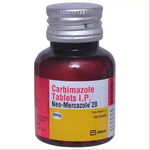thyrodip
Thyrodip 10mg Tablet is a medication that can be taken alone or in combination with other drugs It can be taken with or without food as per your doctors instructions It is important to take it exactly as prescribed and your doctor will determine the appropriate dosage and frequency It is essential to take this medicine regularly in order to derive maximum benefits Do not discontinue the medication unless advised by your doctor even if you start feeling better Some common side effects of this medicine may include nausea headache joint pain gastrointestinal disturbances skin rashes and itching If any of these side effects persist or worsen it is important to inform your doctor Before using this medicine inform your doctor if you have any liver or kidney problems It is also important to disclose all other medications you are currently taking to your doctor Pregnant and breastfeeding mothers should consult their doctors before using this medicine to ensure its safety
Similar Medicines
Available in 3 variations

Thyrodip 10mg Tablet 100s
Thyrodip 10mg Tablet 100s
bottle of 100 tablets

Thyrodip 5mg Tablet
Thyrodip 5mg Tablet
bottle of 100 tablets

Thyrodip 20mg Tablet
Thyrodip 20mg Tablet
bottle of 100 tablets
Related Faqs

If I am planning my pregnancy, can I continue taking Anti-Thyrox?
No, it is advisable not to take Anti-Thyrox during pregnancy as it may cause abnormalities in your baby. You should consult your doctor because if your thyroid hormone levels are not controlled, chances of birth defects in your baby are much more. In case Anti-Thyrox is the only option for you, your doctor will prescribe the lowest possible dose, which will be regulated according to your condition. You can stop it 3-4 weeks before delivery to reduce chances of complications in your baby.

Even if my liver is normal, can Thyrodip cause any liver problems?
Yes, Thyrodip may cause liver problems, though not in everyone. A very common side effect of Thyrodip can be yellowing of skin and eyes (jaundice). It may also cause abnormal liver function tests, hepatitis, etc. If you notice jaundice, you should discontinue Thyrodip and seek immediate medical advice.

My sister is taking Thyrodip for overactive thyroid gland. She frequently gets sore throat and stops and restarts the treatment again and again. Is there any risk if she continues to take Thyrodip when she has sore throat?
Very rarely, Thyrodip interferes with the bone marrow and causes a drastic drop in white blood cells. These white blood cells are a part of the bodys defense against bacterial infections, such as sore throats. So, a sore throat can sometimes be the first clue that Thyrodip is affecting the bone marrow. Your sister should contact her doctor and get a blood test. If blood test shows her white blood cell count to be normal, then she can continue Thyrodip. If not, she should stop the treatment after consulting the doctor.

My sister is taking Sterzole for overactive thyroid gland. She frequently gets sore throat and stops and restarts the treatment again and again. Is there any risk if she continues to take Sterzole when she has sore throat?
Very rarely, Sterzole interferes with the bone marrow and causes a drastic drop in white blood cells. These white blood cells are a part of the bodys defense against bacterial infections, such as sore throats. So, a sore throat can sometimes be the first clue that Sterzole is affecting the bone marrow. Your sister should contact her doctor and get a blood test. If blood test shows her white blood cell count to be normal, then she can continue Sterzole. If not, she should stop the treatment after consulting the doctor.
Related Posts

1:15
Hashimoto's Thyroiditis: An Unknown Autoimmune Disease.

1:15
Why Is Calcium Important for Kids? Common Deficiency Symptoms You Shouldn’t Ignore!

1:15
How to Increase Your Child’s Weight Naturally? Healthy Diet Tips for Parents!

1:15
Are Your Hormones Out Of Balance? Signs & Symptoms!

1:15
Amazing Benefits of Flaxseeds | Best Way to Eat Flax Seeds Daily!

1:15
Why Is There Blood in Your Poop? Causes, Symptoms, and When to See a Doctor!


















.svg)
